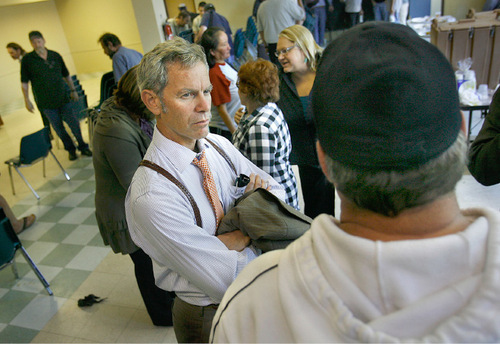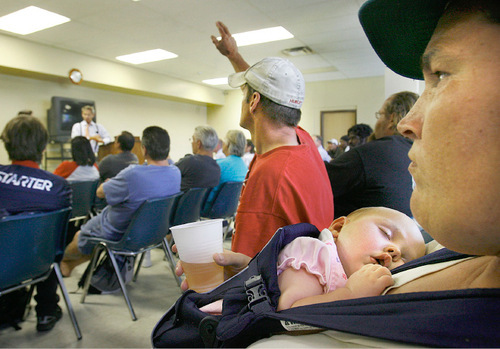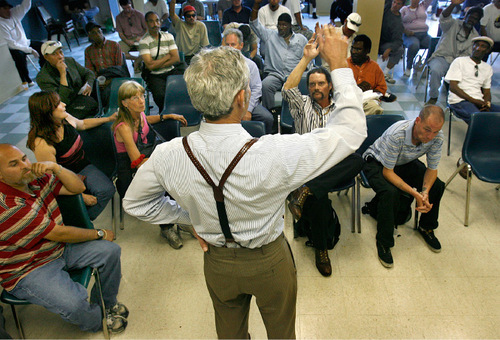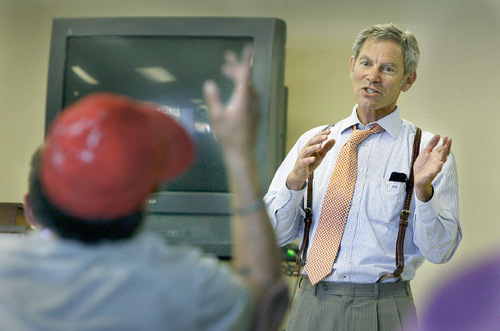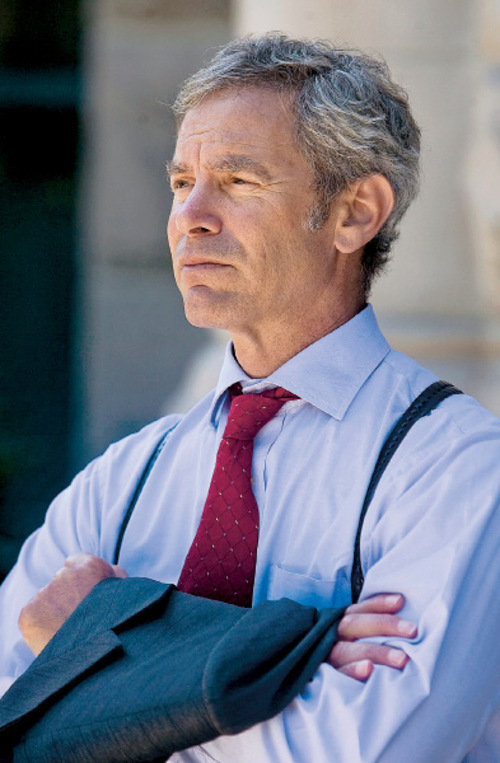This is an archived article that was published on sltrib.com in 2010, and information in the article may be outdated. It is provided only for personal research purposes and may not be reprinted.
Why do the cops ticket us for smoking? Why won't City Hall help us find jobs? Why are we harassed daily on the city's streets? Where can we find a cheap dentist?
Munching on soft cookies, about 75 homeless people fired those hardballs at Salt Lake City Mayor Ralph Becker at the downtown homeless shelter Monday night. Gamely and patiently, the mayor answered some, deflected others and tried for three hours in three "town hall" venues to prove he is a team player regarding the plight of the destitute.
Then, the crowd hurled a curve ball. The Road Home shelter, they complained, is changing its rules. Beginning Oct. 12, single men will be forced to check in and out daily — with their bags in tow — rather than setting up camp for 90-day stints. The move will free up beds for men who actually show up each night. But it could clog streets with homeless lugging large bags since they can no longer stash their stuff at the shelter.
"What is the city's policy going to be with 600 people roaming around the streets of Salt Lake?" asked Trent, a clean-cut young man who declined to give his last name out of concern it could hurt his job prospects.
"Walking around Salt Lake with a backpack is not against the law," Becker said.
The mayor pledged to talk to police about using restraint and treating homeless men and women with respect.
Becker stressed that the city has more transitional housing than ever and noted social-service leaders are five years into a 10-year plan to end chronic homelessness in Utah.
"I'm a pretty empathetic kind of guy," Becker said. "This alerts me to things we need to be focused on. We're not going to solve the need of every person, but we're going to continue working on it."
But the Great Recession has changed Salt Lake City's homeless scene. Suddenly, the downtown shelter is teeming with as many strollers as duffle bags.
"We've never seen more families than we have now," said Matt Minkevitch, executive director of The Road Home. "Just a deluge of families."
As Becker passed around a cordless microphone, many young mothers were busy bottle-feeding infants or stacking slices of pepperoni pizza to feed their children.
Jennifer Dowling, whose family arrived at the shelter from Kansas three weeks ago, said she is surprised at how poorly the homeless are treated here.
"If you get a homeless person to walk down in [The] Gateway, the people who own those businesses and things like that pitch a fit," Dowling told Becker while feeding 4-month-old Brienna, strapped to her chest. "They stereotype us. They say, 'You're homeless, that means you're a drunk or drug addict.' That's just not true. I feel that's how the police look at us."
The mayor urged people to send complaints to the city's independent Civilian Review Board, which screens police behavior. Paperwork for that, housing options and job prospects could be set up at the shelter, he said. Becker, whose town-hall visits included Weigand Resource Center, The Road Home and Volunteers of America, also encouraged the homeless to voice key complaints to the Utah Legislature, which handles most of the purse strings.
"We will try to be helpful to find solutions, but we don't run these services," said Becker, who noted he nonetheless has staff members working full time on equality issues. "There is an incredible amount of commitment and goodwill and good intentions from Salt Lake City."
Not all the men living on life's margin were convinced. Some bolted the question-and-answer session to smoke in the courtyard.
"It's a joke. He's pacifying us," said Richard Haight between sessions. "There's some serious matters here. There were no direct answers."
Before walking out, a man known as "Bear," who declined to give his name, insisted that most shelter regulars face daily discrimination and police harassment.
"Some of your laws down here," he said, "are really appalling."
Even so, Becker's proposed panhandling crackdown never came up. Neither did the (now suspended) citations for daytime snoozes in city parks. The latter led to a Washington Square "sleep in" protest in May.
Yolanda Francisco-Nez, the city's diversity and human-rights coordinator, says she hears a mix of criticism and support regarding the panhandling proposal. Overall, she said, the homeless community signals that City Hall is "attentive."
"It's important for us to keep in touch with those on the ground level who are personally impacted by the decisions we make in government," Francisco-Nez said as shelter staff assembled snacks for the town-hall meeting.
"You want to remain an inclusive city."
Minkevitch says the same is true of the shelter. He notes no homeless people will be turned away this winter, even as numbers are expected to again spike from 600 to 900. Extra families will find space at the overflow shelter in Midvale he said, while St. Vincent de Paul, across the street from The Road Home, will open its doors for the men.
After the Oct. 12 rule change, locating alternative space for people's things is unlikely, Minkevitch said. But he added that the policy change is necessary.
"Beds that were utilized to store people's stuff will now be utilized to store human beings," he said, "which is our mission."
New shelter rule: House people, not stuff
Beginning Oct. 12, The Road Home homeless shelter in downtown Salt Lake City will eliminate its 90-day bed-pass policy. Instead of issuing a homeless person a bed for a three-month stint, shelter officials will require single men to check in and out — with their belongings — each day. The move, particularly now that summer is over, is designed to accommodate more men seeking shelter at 210 S. Rio Grande St. But it could flood the city's streets with homeless people carting their stuff. Under the old policy, up to 60 beds per night would sit unoccupied, acting as storage space for belongings.


